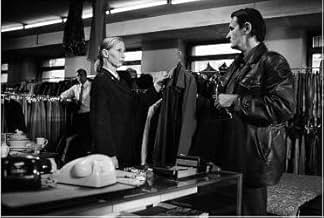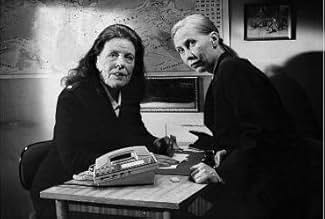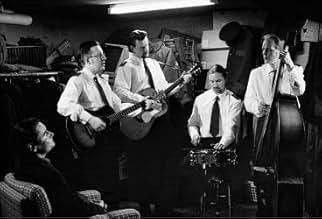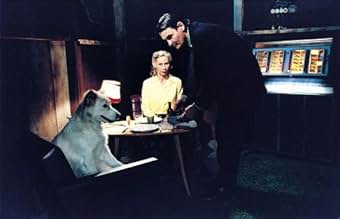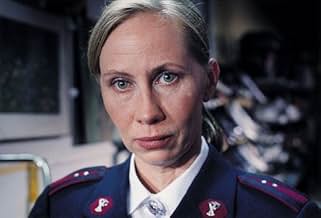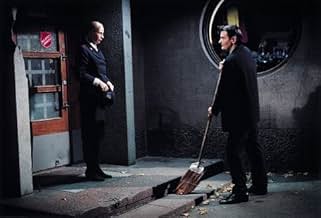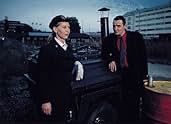ÉVALUATION IMDb
7,6/10
28 k
MA NOTE
Ajouter une intrigue dans votre langueM arrives in Helsinki only to be viciously attacked by thugs and pronounced dead by medics. He revives but with no memory of his past or his identity. He rebuilds his life from scratch, but ... Tout lireM arrives in Helsinki only to be viciously attacked by thugs and pronounced dead by medics. He revives but with no memory of his past or his identity. He rebuilds his life from scratch, but the past inevitably catches up with him.M arrives in Helsinki only to be viciously attacked by thugs and pronounced dead by medics. He revives but with no memory of his past or his identity. He rebuilds his life from scratch, but the past inevitably catches up with him.
- Nommé pour 1 oscar
- 21 victoires et 27 nominations au total
Avis en vedette
10a2859289
Whoever has seen any of Aki Kaurismäki's films might agree that they are all but mainstream. Nevertheless, the story itself doesn't have to be too complicated. In this case, a man completely loses his past in a shockingly violent way, and he rediscovers life again in an environment of bums who sleep in containers. The good thing I found about this movie was: No romanticism of misery, no enlightenment of the tortured hero, no sob-stuff love story, no superfluous, aloof intellectualism at all. At least not in an obtrusive or overly serious way. But in a way that it sometimes shocked me , sometimes made me laugh, sometimes grin. I was never bored. And as I made it to Finland for the first time in my life a few weeks after seeing this movie - I found everything to be amazingly authentic.
A remarkable film that definitely moves into my shrine of the best 50!
A remarkable film that definitely moves into my shrine of the best 50!
This Finnish film may not be for everyone. Though nominated in 2002 for an Oscar for best foreign film, I don't think it got much play in the US. It's a quiet movie about a guy who is beaten in a park in Helsinki right after getting off a train. The hospital thinks he's dead, but he staggers out, gradually recovers, and can't remember a thing. He meets a number of people, most of whom help him in some way or another. He meets a Salvation Army woman and a relationship develops.
It's hard to describe this movie. The dialogue is often funny, but delivered absolutely deadpan. There is no excitement, but a rich development of story and relationships through incidents that happen to the lead character or that he causes to happen. The two leads, Markku Peltoa and Kati Outinen, are adults and look it. There's no Hollywood handsomeness about either of them. The structure of the movie is a gem of economy. One scene ends and the film moves briskly on to the next scene. No extended, unnecessary character development. No superfluous dialogue. It may sound pompous, but this movies creates at the end a nice feeling of mature contentment.
It's hard to describe this movie. The dialogue is often funny, but delivered absolutely deadpan. There is no excitement, but a rich development of story and relationships through incidents that happen to the lead character or that he causes to happen. The two leads, Markku Peltoa and Kati Outinen, are adults and look it. There's no Hollywood handsomeness about either of them. The structure of the movie is a gem of economy. One scene ends and the film moves briskly on to the next scene. No extended, unnecessary character development. No superfluous dialogue. It may sound pompous, but this movies creates at the end a nice feeling of mature contentment.
Herzog introduced me to the tension created by moving back and forth from highly styled scenes to realistic ones in syncopated steps. It has an extraordinary effect; I do not know who first devised this technique, but it matters.
Sometimes, you will see it adding value on the real side. Rarely is it ever used this way, to multiply anchor a minimalist sketch of fate. Jarmusch does this, perhaps being the master, but this is pretty clean, novel and effective as well. Its because Fins are inherently minimalist in a particularly overt way. Stylized in a stylized way, perhaps to stand above its neighbors who value cleanliness but only after passing through terminal sophistication.
There is a sweet purity to this man we see, and the man we do not who made the thing. There is an honor in just getting up in the morning. The people here are either honest and generous — even the local cop who exploits the poor — or crippled participants in the machine. Everyone with a conventional job is in this latter class.
Just as with most Jarmusch, music and the enrichment it brings, is woven into the story as an intrinsic element. The music itself is highly stylized, and like the film is an abstraction of deep, rich emotion. It is played here by a Slavation Army band our hero brings to musical salvation. The love story matters I think, because it depends on nothing other than simple need and directness.
Ted's Evaluation -- 3 of 3: Worth watching.
Sometimes, you will see it adding value on the real side. Rarely is it ever used this way, to multiply anchor a minimalist sketch of fate. Jarmusch does this, perhaps being the master, but this is pretty clean, novel and effective as well. Its because Fins are inherently minimalist in a particularly overt way. Stylized in a stylized way, perhaps to stand above its neighbors who value cleanliness but only after passing through terminal sophistication.
There is a sweet purity to this man we see, and the man we do not who made the thing. There is an honor in just getting up in the morning. The people here are either honest and generous — even the local cop who exploits the poor — or crippled participants in the machine. Everyone with a conventional job is in this latter class.
Just as with most Jarmusch, music and the enrichment it brings, is woven into the story as an intrinsic element. The music itself is highly stylized, and like the film is an abstraction of deep, rich emotion. It is played here by a Slavation Army band our hero brings to musical salvation. The love story matters I think, because it depends on nothing other than simple need and directness.
Ted's Evaluation -- 3 of 3: Worth watching.
MAN WITHOUT A PAST, THE (Aki Kaurismäki - Finland/France/Germany 2002).
This second installment in Aki Kaurismaki's projected "Finland Trilogy" is a heart-warming fable about a man (Markku Peltola) who loses everything, including his identity. After M, as he is referred to for the rest of the film, dozes off on a park bench, he is awoken by a trio of thugs who brutally beat him up, steal his money and toss his wallet and identity papers into the trash bin. In the hospital, he is pronounced dead by the doctors, but by some miracle he springs back to life but with no memory whatsoever of his past or his identity. Now a penniless amnesiac, he has to build his life from scratch. Without knowing a single person (and without a single person knowing him), he must try to survive, but he soon acquires a melancholy dog named Hannibal and falls in love with Irma, a lonely salvation army soup kitchen volunteer. Of course, his past does catch up with him, but it only works to point out what's really important in his future life.
Kaurismäki usually champions the outcasts of society and here it's no different. He once said: "I make films for the unemployed, but since they don't have money to buy cinema tickets I generally have no audience." Of course, Kaurismäki has a huge audience by now, but no matter how simple and accessible the story in the film might look, he still manages to blend romance, quirky comedy and social commentary, seemingly effortless into the film's narrative.
Most of the humor doesn't come from any written gags or jokes but springs from the absurdity of the situations, all in Kaurismäki's typical deadpan-comedy style, complete with nods top '50s B-movies, rock'n'roll ("rhytm music", as it's called by M), fairytale romance and an incomparable soundtrack, featuring British beat combo, The Renegades. I just love the music in this film! Time and place hover between Helsinki in the '30s and the present. Despite the idiosyncratic set-up and the strange unreal dialog, it's incredible how very real all these characters feel. Deep sentiment but every inch of it sincere. I can't get enough of this film, no matter how often I've seen it.
Camera Obscura --- 9/10
This second installment in Aki Kaurismaki's projected "Finland Trilogy" is a heart-warming fable about a man (Markku Peltola) who loses everything, including his identity. After M, as he is referred to for the rest of the film, dozes off on a park bench, he is awoken by a trio of thugs who brutally beat him up, steal his money and toss his wallet and identity papers into the trash bin. In the hospital, he is pronounced dead by the doctors, but by some miracle he springs back to life but with no memory whatsoever of his past or his identity. Now a penniless amnesiac, he has to build his life from scratch. Without knowing a single person (and without a single person knowing him), he must try to survive, but he soon acquires a melancholy dog named Hannibal and falls in love with Irma, a lonely salvation army soup kitchen volunteer. Of course, his past does catch up with him, but it only works to point out what's really important in his future life.
Kaurismäki usually champions the outcasts of society and here it's no different. He once said: "I make films for the unemployed, but since they don't have money to buy cinema tickets I generally have no audience." Of course, Kaurismäki has a huge audience by now, but no matter how simple and accessible the story in the film might look, he still manages to blend romance, quirky comedy and social commentary, seemingly effortless into the film's narrative.
Most of the humor doesn't come from any written gags or jokes but springs from the absurdity of the situations, all in Kaurismäki's typical deadpan-comedy style, complete with nods top '50s B-movies, rock'n'roll ("rhytm music", as it's called by M), fairytale romance and an incomparable soundtrack, featuring British beat combo, The Renegades. I just love the music in this film! Time and place hover between Helsinki in the '30s and the present. Despite the idiosyncratic set-up and the strange unreal dialog, it's incredible how very real all these characters feel. Deep sentiment but every inch of it sincere. I can't get enough of this film, no matter how often I've seen it.
Camera Obscura --- 9/10
The Man Without a Past, the second installment in Aki Kaurismäki's "losers" trilogy (the first being 1996's Drifting Clouds), is, to date, the only Finnish film to have received a Best Foreign Language Film Oscar nomination, and deservedly so. It's a wonderful, heartbreaking opus, and arguably Kaurismäki's finest movie.
At the story's center we find a nameless man (Markku Peltola), who arrives in Helsinki for unknown reasons. That same night, he's brutally assaulted by a group of punks. This incident makes him look dead, although we immediately learn he is alive, if completely amnesiac. With no idea of who he is or what he's supposed to do, he starts looking for a home and an employment. He manages to rent a "house" in the city outskirts (don't miss Sakari Kuosmanen as the landlord) and befriends Irma (Kati Outinen), a social worker who tries to help M (in lack of a better name, and given "X" is quite overused) as much as possible. It is this friendship, which slowly evolves into something deeper, that truly motivates the protagonist in his pursuit of a better life.
The Man Without a Past strikes us because, unlike other films involving amnesia, it makes us hope M won't recover his memory: what he experiences throughout the movie, the people he meets, that's what really matters. It's a little bit like a road movie (they never end with the characters reaching their destination), only this time the voyage involves the mind and the spirit. It's a similar voyage the director asks the audience to join, as he artfully explores human life and its chances of improvement.
Moving and reminiscent of Italian neorealism (De Sica, Rossellini, Visconti), The Man Without a Past is a flawless reflection on how happiness is to be found anywhere, no matter the circumstances.
At the story's center we find a nameless man (Markku Peltola), who arrives in Helsinki for unknown reasons. That same night, he's brutally assaulted by a group of punks. This incident makes him look dead, although we immediately learn he is alive, if completely amnesiac. With no idea of who he is or what he's supposed to do, he starts looking for a home and an employment. He manages to rent a "house" in the city outskirts (don't miss Sakari Kuosmanen as the landlord) and befriends Irma (Kati Outinen), a social worker who tries to help M (in lack of a better name, and given "X" is quite overused) as much as possible. It is this friendship, which slowly evolves into something deeper, that truly motivates the protagonist in his pursuit of a better life.
The Man Without a Past strikes us because, unlike other films involving amnesia, it makes us hope M won't recover his memory: what he experiences throughout the movie, the people he meets, that's what really matters. It's a little bit like a road movie (they never end with the characters reaching their destination), only this time the voyage involves the mind and the spirit. It's a similar voyage the director asks the audience to join, as he artfully explores human life and its chances of improvement.
Moving and reminiscent of Italian neorealism (De Sica, Rossellini, Visconti), The Man Without a Past is a flawless reflection on how happiness is to be found anywhere, no matter the circumstances.
Le saviez-vous
- AnecdotesIn the bar scene there is a portrait photo of Matti Pellonpää on the wall. He played in numerous Kaurismäki films before his sudden death in 1995.
- GaffesThe Helsinki railway station's extension roof is clearly visible at the opening scene, but it hadn't been built yet in 1996 (the year can be read from the newspaper).
- ConnexionsFeatured in Matka suomalaiseen elokuvaan: Naurua pimeässä (2006)
- Bandes originalesDo The Shake
Performed by The Renegades
Music & Lyrics by Brown / Gibson / Johnson / Mallett
Published by Warner / Chappell Music Finland
(P) 1964 Scandia / Warner Music Finland
Licensed courtesy of Warner Music Finland
Meilleurs choix
Connectez-vous pour évaluer et surveiller les recommandations personnalisées
- How long is The Man Without a Past?Propulsé par Alexa
Détails
- Date de sortie
- Pays d’origine
- Sites officiels
- Langue
- Aussi connu sous le nom de
- The Man Without a Past
- Lieux de tournage
- sociétés de production
- Consultez plus de crédits d'entreprise sur IMDbPro
Box-office
- Budget
- 8 000 000 FIM (estimation)
- Brut – États-Unis et Canada
- 921 847 $ US
- Fin de semaine d'ouverture – États-Unis et Canada
- 23 281 $ US
- 6 avr. 2003
- Brut – à l'échelle mondiale
- 9 564 237 $ US
- Durée1 heure 37 minutes
- Couleur
- Mixage
- Rapport de forme
- 1.85 : 1
Contribuer à cette page
Suggérer une modification ou ajouter du contenu manquant

Lacune principale
What is the Canadian French language plot outline for L'homme sans passé (2002)?
Répondre





